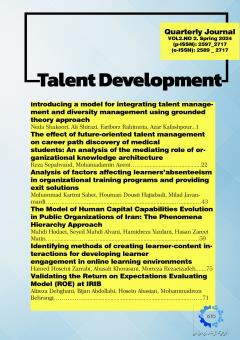The Model of Human Capital Capabilities Evolution in Public Organizations of Iran: The Phenomena Hierarchy Approach
Subject Areas : New theories and models of human resource training and developmentMehdi Hodaei 1 , Seyed Mehdi Alvani 2 , Hamid Reza Yazdani 3 , Hasan Zarei Matin 4
1 - University of Tehran
2 - Allameh Tabataba’I University
3 - University of Tehran
4 - University of Tehran
Keywords: Human CapitalCapabilities EvolutionPublic OrganizationsPhenomena Hierarchy,
Abstract :
Objective: The purpose of this article is how to evolute human capital capabilities in public organizations of Iran. One of the problems in public organizations is single-dimensional view of managers to functions and processes that is an obstacle for evolution. Methods: The research method of this paper to solve the complex problem of human capital capabilities evolution is critical hermeneutics; in this regard, the main axes of systems thinking are studied, interpretation and sympathy between theories are presented firstly; then dimensions are examined in the interpretative paradigm, the expressions and synthesis of key concepts are declared. On the basis of selected method to answer the questions appropriate to the subject of evolution, the purposeful and judgmental sampling has been used. Data gathering method is library, internet searching and looking up in texts, documents and evidences; the gathering tool is taking note. Results: Human capital capabilities in the phenomena hierarchy approach of this matrix are evoluted from simple to complex that more complex level includes the capabilities of more simple levels. The model of human capital capabilities evolution is a system include of public organizations structure, human resource management processes and human capital functions components that are interrelated holistically, synergically and circularly to create shared value and common interest in the Islamic-Iranian context. The results of this research are presented in combination of dimensions, aspects and multi-layer levels.
1. قرآن.
2. Curtis B, Hefley B, Miller S. People Capability Maturity Model (P-CMM). Version 2.0, 2nd Edition. 2009. Carnegie Mellon University.
3. Swanson RA. Human Resource Development Definition. 1987. In RL Jacobs (Editor), Human Resource Development as an Interdisciplinary Body of Knowledge. Human Resource Development Quarterly. 1(1), Spring: 65-71.
4. McLean GN, McLean L. If We Can't Define HRD in one Country, How Can We Define it in an International Context? Human Resource Development International. 2001; 4(3): 313-326.
5. Bloom BS (Editor), Engelhart MD, Furst EJ, Hill WH, Krathwohl DR. Taxonomy of Educational Objectives: The Classification of Educational Goals. Handbook 1: Cognitive Domain. 1956. NY: David McKay.
6. Krathwohl DR. A Revision of Bloom's Taxonomy: An Overview. Theory into Practice. 2002; 41(4), Autumn: 212-218.
7. Lee M. A Refusal to Define HRD. Human Resource Development International. 2001; 4(3): 327–341.
8. حافظ. غزلیات.
9. قانون اساسی جمهوری اسلامی ایران. (1358).
10. سند چشمانداز جمهوری اسلامی ایران در افق ۱۴۰۴. (1382).
11. سیاستهای کلی برنامه ششم توسعه. (1394).
12. سیاستهای کلی برنامه پنجم توسعه. (1387).
13. مطهری، مرتضی. (1383). انسان کامل. چاپ سیام. تهران: بنیاد علمی و فرهنگی استاد شهید مرتضی مطهری.
14. مطهری، مرتضی. (۱۳۶۱). علل گرایش به مادیگری. تهران: دفتر انتشارات اسلامی.
15. ملاصدرا. (1981). الحکمة المتعالیة فی الاسفار العقلیة الاربعة. بیروت: دار الاحیاء التراث.
16. الوانی، سید مهدی؛ هاشمیان، محمد حسین (1387). بازخوانی دانش سیاستگذاری در زمینه پستمدرنیسم: شکلگیری خطمشی در عصر پستمدرن. فصلنامه روششناسی علوم انسانی، 14(56)، 122-99.
17. شیرزادی، رضا. (1393). نوسازی، توسعه و جهانی شدن (مفاهیم، مکاتب و نظریهها). چاپ دوم. تهران: نشر آگه.
18. فروغی، محمد علی. سیر حکمت در اروپا، ج. 3. در مرتضی مطهری (ویرایشگر)، انسان کامل. چاپ سیام. بنیاد علمی و فرهنگی استاد شهید مرتضی مطهری.
19. موثقی، سید احمد. (1390). صلح، امنیت و توسعه. تهران: انتشارات دانشگاه تهران.
20. Paterson M, Higgs J. Using Hermeneutics as a Qualitative Research Approach in Professional Practice. The Qualitative Report. 2005; 10(2): 339-57.
21. Ajjawi R, Higgs J. Using Hermeneutic Phenomenology to Investigate How Experienced Practitioners Learn to Communicate Clinical Reasoning. The Qualitative Report. 2007; 12(4): 612-38.
22. Van Manen M. Researching Lived Experience: Human Science for an Action Sensitive Pedagogy. 1990. New York, NY: State University of New York Press.


